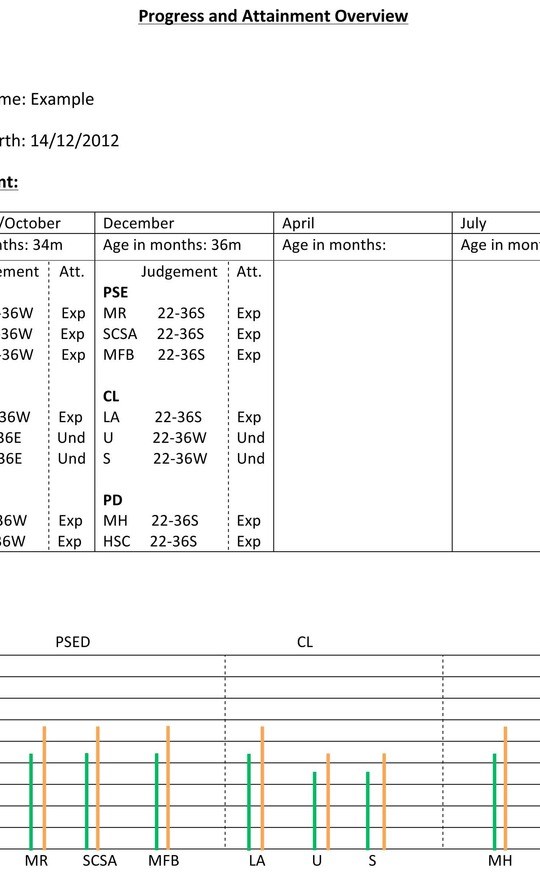Management - Assess for success
Lyndsey Murray
Monday, November 30, 2015
Ofsted has praised her ‘exemplary’ assessment and inclusion system – here, Lyndsey Murray, manager of St Richard’s Atherton Pre-School, shares her methods

An effective assessment system must do much more than simply highlight children’s progress. It is necessary to successfully develop provision around children’s changing needs.
The introduction of the Common Inspection Framework (CIF) in September brought with it a new set of terminology associated with assessment, and one of the biggest focuses is on ensuring that children make ‘typical’ progress. Most children must make ‘better than typical’ progress and those children who are underperforming must ‘catch up quickly’.
In the accompanying Early Years Inspection Handbook, a child will be seen to be making ‘typical’ progress when they consistently meet age-related expectations. For some children with additional needs, they may not meet age-related expectations, but should make significant progress in relation to their stating points. For these children, individual support interventions are essential.
 All children, including those with special educational needs and disabilities (SEND), should make outstanding progress, so it is important to have a process for identifying and responding to individual needs that demonstrates high expectations of all children. In my setting, I have fully integrated my assessment systems into my protocol for inclusion.
All children, including those with special educational needs and disabilities (SEND), should make outstanding progress, so it is important to have a process for identifying and responding to individual needs that demonstrates high expectations of all children. In my setting, I have fully integrated my assessment systems into my protocol for inclusion.
How the process works
1. We use Development Matters to track children’s progress towards the early years outcomes. Over time, we collect a range of evidence, including information from parents, to highlight the statements on the tracker document.
2. At set times of the year, key people carry out formative assessments based on a best-fit judgement of where children are operating on the tracker document for each area of learning. They indicate whether a child is ‘emerging’, ‘developing’ or ‘secure’ within a certain age band. Formative assessment is carried out in this way when a child first starts, and the key person records the child’s starting point then, and at the end of each term. Every term, I moderate all assessments with the child’s key person and a selected number with parents, to ensure a best-fit judgement.
3. A progress and attainment overview is produced for each child (see below). I measure progress by establishing where the child was at two different points in time, for example: in October a child was ‘emerging’ in the 22-36 months age band’ and in December he was ‘developing’. Originally, I started off using a paper form, but an Excel spreadsheet is beneficial for collecting data for analysis. Formulas can be used to automatically work out ages in months, if a child is meeting age-related ‘expected’ milestones or if they are ‘below’ or ‘ahead’.

4. I use this information to inform a ‘graduated response’. Collecting data in this way allows me to clearly identify gaps in learning. The graduated response provides a gradual and tailored approach to meeting children’s needs by offering the correct type of support dependent. For example, some children may require only limited support in one area of their learning and so may need the educational programmes tailored; others may have a greater level of delay and need more focused and intense support.
Graduated response
The graduated response consists of four registers:
1. Universal Register: for all children, including those meeting expectations.
2. Monitoring Register: for those slightly under age-related expectancy, in just one or two strands of learning, but continue or are expected to catch up quickly.
3. Focused Register: for children slightly under age-related expectancy, in more than two strands of learning, where gaps in their development are likely to widen over time.
4. Complex Register: for children who are 50 per cent below age-related expectancy in two or more strands of learning and those making little progress even with support interventions in place.
Register interventions
Each register has its own specific list of interventions:
Universal Register: all children are exposed to the educational programmes, which are differentiated to support and challenge children and are developed in line with children’s changing interests. An open and ongoing dialogue with parents is supportive of all opportunities. Ongoing assessment is used to support the next steps in children’s learning and, alongside the delivery of the Early Years Foundation Stage, educational programmes such as phonics programmes, Every Child A Talker, Elklan, basic communication groups and Toddler Talk, develop this further. Links with universal health services help to support learning and development; this includes carrying out integrated reviews.
Monitoring Register: identified gaps from the tracker document are used to develop interventions, delivered through medium-term planning. Gaps are ringed on the tracker and form the planning focus for the following term. If a child is not meeting expectations in, say, ‘understanding’ and ‘speaking’, the tracker is used to highlight where gaps remain under those headers.
Focused Register: further differentiation is offered. Children on this register will have an Individual Support Plan to support learning within an area of their development. The support plan will be developed and reviewed with parents.
Complex Register: this means referral to specialist support agencies, including the local authority SEND team. One-to-one targeted support is provided to an extent, dependent to the child’s needs to enable them to access development opportunities available. Preparation for additional resources to support the child’s transition to primary school is necessary and an Education, Health and Care Plan may be considered dependent on the child’s needs and how they emerge.
As a manager, this enables me to intervene in the areas that need it most. This system also ensures resources are used efficiently. Each stage of support builds on the others; for example, those children who are on the Focused Register will also be supported with interventions at both ‘universal’ and ‘monitoring’ level. The CIF also brings about an increased accountability for providers to be clear about additional support arrangements and their effectiveness in helping to close learning gaps. This is particularly useful for Early Years Pupil Premium children. Our approach enables us to clearly show that funding is focused.
Children can move up and down the thresholds within the graduated response and may progress to a universal level of support once the gaps in their learning close and they start to make ‘typical’ and ‘better than typical’ progress.
I find it helpful to compile separate registers entitled ‘monitoring’, ‘focused’ and ‘complex’, as this helps to make clear the links between the level of need and interventions in place to support them. For children not making ‘typical progress’, it is important to demonstrate that they are receiving the support necessary to enable them to achieve their potential.




